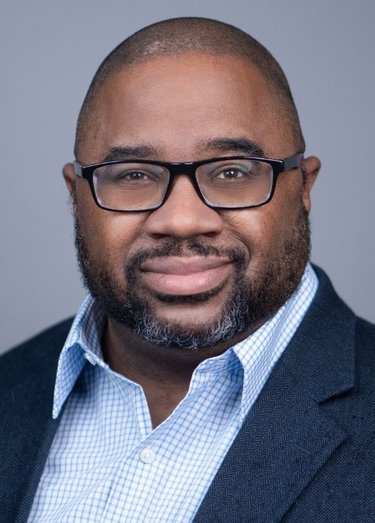Westbrook wants to make sure ‘everyone feels they belong’
GUILDERLAND — Derek Westbrook taught poetry to men imprisoned at Ray Brook, a federal penitentiary in the Adirondacks.
“It was fun because it was all about people finding their voice,” he said. “I didn’t think that poetry was going to be too popular at the prison. Turned out it was one of the most popular programs.”
While Westbrook talked to the prisoners about poetry, he also had them write it and perform it “and really work on people finding their voice,” he told The Enterprise this week.
“I think one man said it best. He said, ‘You not just teach us about poetry; you teach us about being men.’ And that was the fun part of it, watching people find their voice and speak in a way that can be heard.”
Nearly two decades later, Westbrook is still making sure that the voices of a wide variety of people are being heard.
He is the new director of diversity, equity, and inclusion for the Guilderland schools, replacing Matthew Pinchinat, a Guilderland social studies teacher who, in 2021, was the first to fill the post; Pinchinat left the district in July to work as deputy managing director of DEI for the state Teachers’ Retirement System.
Westbrook will earn $110,000 annually for the year-round Guilderland schools post.
The district had 42 applicants for the job, and Westbrook was the only repeat candidate from two years prior.
“He showed persistence matters,” said the district’s superintendent, Marie Wiles.
A large committee of stakeholders — including parents, school board members, students, and workers from each of Guilderland’s bargaining units — winnowed the applicants to four. Each was asked to do an “authentic task,” which was responding to a real-life situation last fall where students had worn blackface to a football game.
“Derek was everyone’s first pick,” said Wiles, describing him as “very personable” with “lots of experience.”
Asked if it was essential to be a person of color to fill the post, Wiles said, that was certainly an element in the decision-making but “not the element.” Rather, what was important, Wiles said, was who would best help the whole district move forward.
“If Derek wasn’t a person of color, we would have hired him anyway,” she said. Wiles went on to relate something Westbrook had said during his job interview.
He works through difficult topics by “starting from a place of empathy,” Wiles reported. “He says, ‘My job isn’t to change minds. It’s to open minds.’ I just love that,” concluded Wiles. “That’s what education is all about.”
“Where it all happens”
Westbrook grew up in Floyd, New York, a small town in Oneida County. “The major employer was the psychiatric center so both of my parents worked for the state,” he said, “and we were the only Black family in that community.”
Although the rural-suburban school district was much smaller than Guilderland’s, it was “similar in composition,” he said. His alma mater, Holland Patent Central High School, currently has about 400 students and is 98 percent white while Guilderland Central High School currently has about 1,500 students and is 71 percent white.
“It definitely had its challenges,” Westbrook said of coming from the only Black family in town.
It didn’t stop him from being a well-rounded student though. He played football and ran track. “I still have records on the wall,” he said.
He also sang in the school choir and played the string bass in the school orchestra. “We all took piano lessons,” he said of he and his siblings. “But I was not the one who really took to it the way my brother and sister did.”
Between his junior and senior years of high school, Westbrook attended Cornell Summer College, which he described as a “transformative learning experience.”
“There were students from 48 different countries and 48 different states,” he said. “For a kid who barely got out of central New York in his life, it was like being dropped in this whole cultural immersion. … It really began to shape my goals in higher education.”
Westbrook went on to the University at Albany where he majored in Africana studies and had minors in both English and psychology.
Poet Leonard A. Slade Jr., who headed the department, called Westbrook a protégé, he said. “I think he said that to everybody,” Westbrook said with modesty, adding, “He definitely was a big supporter of me when I was writing there and he definitely helped me.”
During his university years, Westbrook wrote for the school newspaper, won a national poetry contest, was an all-American running track, and was president of the Black Alliance.
“Once you get the bug of student activism …. You want to be doing something all the time,” he said.
After graduating with a bachelor’s degree from UAlbany in 1992, Westbrook went to Ohio State University for his master’s degree in Black culture studies.
He had a teaching fellowship and, at age 22, he taught a class he designed himself, an introduction to Black studies.
“I think the students didn’t know what hit them,” he said, noting he required his students to take weekly quizzes, keep a journal, write papers, and also take midterm and final exams.
“I was very excited about teaching,” Westbrook said. “And I think, if the students didn’t pick up on my enthusiasm, they might have revolted.”
His love of teaching sustained him in the classroom for 20 years.
He returned to the University at Albany in 1996 as a student in the doctoral program for education administration and policy studies and completed the required coursework. Although he wrote four chapters of a dissertation on general education curriculum in for-profit higher education, he left it unfinished.
Even though he was in an administration program, Westbrook said, “I was still interested in curricular issues largely being in a major that’s on the periphery of education …. One of my questions always was: How are we, in general-education requirements and higher ed, to ensure that everybody has a well-rounded education?”
He was drawn to the job at Guilderland, Westbrook said, because, while he has worked as a consultant at a variety of schools, most “have one person who’s the chief equity officer …. That person is pretty much responsible for doing everything by themselves.”
What appeals to him about Guilderland is it “has a lot of moving parts,” Westbrook said, naming equity committees at each school, an anti-racism committee at the high school, and a district-wide DEI committee.
“It’s integrated into the fabric of the school community,” Westbrook said. Since starting work on Sept. 11, he has been getting to know the culture of each of the district’s five elementary schools, its middle school, and its high school.
“I’m in learning mode,” he said this week.
What drew him to DEI in the first place, Westbrook said, is, like his academic field, “Cultural studies is looking at the whole education; it’s where you reproduce and refine the best of who we are as a people.”
Westbrook concluded, “This is where it all happens. And we want to make sure that everyone feels that they’re connected, that they belong, and that their voices are being heard.
“I wanted to help make sure that we are creating a learning community where everyone feels valued and welcome and learns about each of us so that we can truly make America the best of all of us. Not just the people who are in the majority position but all of the people who have contributed to this country.”



